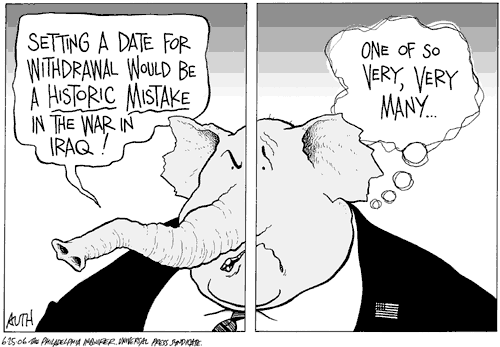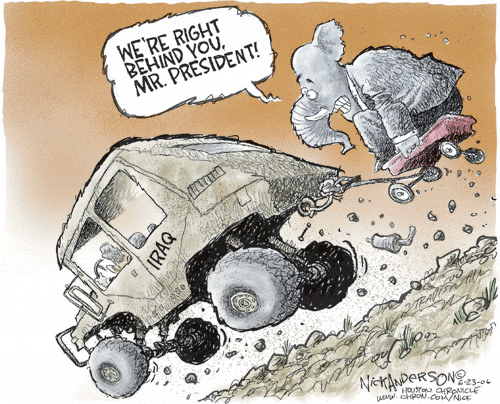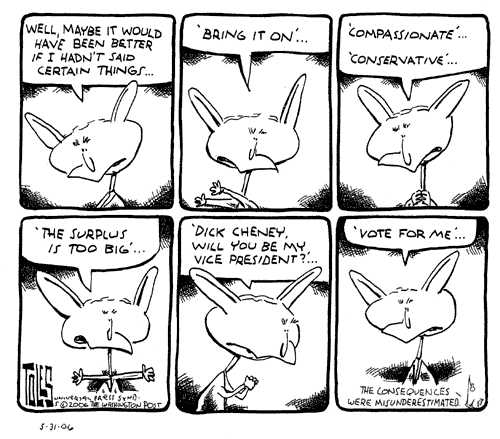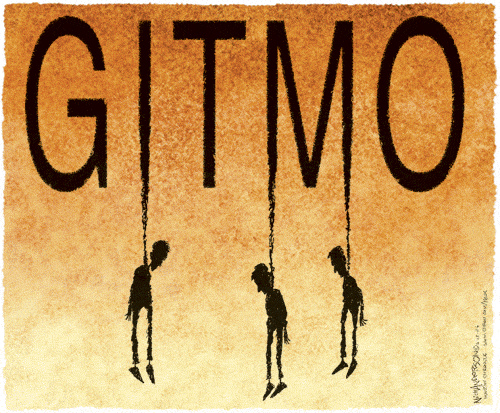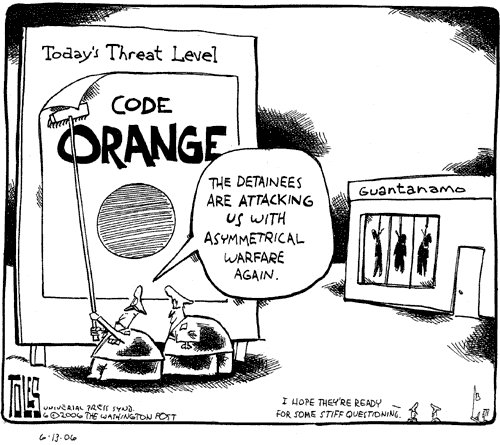BAGHDAD, Iraq, June 23 — Mansour is Baghdad's Upper East Side. It has fancy pastry shops, jewelry stores, a designer furniture boutique and an elite social club.
But it is no longer the address everyone wants.
In the past two months, insurgents have come to Mansour to gun down a city councilman, kidnap four Russian Embassy workers, shoot a tailor dead in his shop and bomb a pastry shop.
Now, Mansour, a religiously mixed area just three miles from the fortified Green Zone, feels more like wartime Beirut than Park Avenue, and its affluent residents worry that the wave of violence that has devoured large swaths of Baghdad has begun encroaching on them.
"It's falling to the terrorists," said Hasaneen F. Mualla, director of the Hunting Club, Mansour's social center. "They are coming nearer to us now. No one is stopping them."
For most of the past six months, Iraq drifted without a government and its security forces largely stood by and watched at crucial moments, like the one in February when Shiite militias killed Sunnis after the bombing of a sacred shrine.
Now, as Iraqi leaders in the Green Zone savor their recent successes — the naming of the first full-term government since the fall of Saddam Hussein and the killing of Abu Musab al-Zarqawi, Iraq's most wanted guerrilla leader — Iraqis outside its walls are more frightened than ever. Neighborhood after neighborhood in western Baghdad has fallen to insurgents, with some areas bordering on anarchy. Bodies lie on the streets for hours. Trash is no longer collected. Children are home-schooled.
The paralysis that shut down life in western Baghdad is creeping ever closer to the heart of the city, and Iraqis in still-livable areas are frantic for the government to halt its advance, something the new leadership pledged to do when it started its new security plan for Baghdad last week.
"It's like a cancer, spreading from area to area," said a guard at Delta Communications, a Mansour cellphone shop that has been shuttered since a bomb blast in front of it last month.
Mansour is an area of stately homes, elaborately trimmed hedges and people who can afford guards. In recent weeks, that has not seemed to matter. Homemade bombs have struck two sport utility vehicles belonging to the former Iraqi exile leader, Ahmad Chalabi, a Mansour resident, twice in the past month. Gangs have kidnapped the United Arab Emirates ambassador and the Russian Embassy workers, whom Al Qaeda claimed to have killed this week. The Hunting Club now tells wedding parties to bring guards.
"These middle- and upper-class families, these guys are not willing to fight," one resident said. "It's like cutting into butter."
The neighborhood has long been tormented by kidnappings; criminal gangs know where the money is. But the violence in the past two months feels more commonplace, and in many ways more relentless, aimed broadly at businesses and neighborhood mainstays.
One victim was the Khassaki Sweet Shop, a fixture on Mansour Street since the 1980's, famous for its plump baklava, candied almonds and cream-filled honey rolls displayed behind a sparkling glass storefront. On May 28, a teenager placed a bag in front of the shop, and moments later it exploded, shattering glass, scattering pastries, and sending a large chunk of shrapnel flying over the head of the cashier.
Earlier this month, workers were building an ugly brick protective wall in front of the shop. A small piece of cloth that read "open" hung above the gaping entrance.
"Ruined! Destroyed!" the owner said angrily. "It's not a first-class shop anymore."
The owner, who refused to give his name, blamed the Americans for the security troubles, an opinion expressed by many in Mansour — Shiite and Sunni alike.
"If the Americans want to destroy Iraq, they are on the right path," said the owner, a Shiite, who stood scowling behind a candy counter. He displayed a pistol jammed in his waistband. "If they can't improve things, they should just leave us alone."
A man waiting in line disagreed: "But not now, we're still in a mess."
The owner shook his head in disgust.
Residents of Mansour have good reason to be afraid. The wave of insurgent crime has already sunk neighborhoods in western Baghdad into anarchy. In Dawra, it is impossible to collect the bodies of the murdered because of sniper fire.
Ali Aziz, a Shiite, had to hastily load the body of his friend into the back of a pickup in Dawra in late April, after the police refused to respond to pleas from the man's widow. He waited until he had reached the safety of a police station to put the body in a coffin.
"There is no government there," said a computer programmer who moved earlier this month from another western Baghdad neighborhood, Amiriya, after four murders on his block. "I want to go to my home, to bring some clothes, but I can't go there. My own country, my own home, and I can't go there."
In Mansour, by contrast, life has not shut down entirely, but has slowed from a bustle to a trickle. An internal American Embassy security document, recently posted on the Internet by The Washington Post, quoted an Iraqi employee who had said Mansour was "an unrecognizable ghost town."
Threats have closed a number of shops on Mansour Street, and the emptiness in the early afternoon is palpable. Earlier this month, two jewelry shop owners were sitting in the back room of a house in the afternoon, watching a World Cup soccer game. Just days before, they had shut their shops when they received telephone calls from a man threatening to bomb them if they did not pay money. It was the day, coincidentally, that Mr. Zarqawi was killed.
"I thought it was one of my friends joking," said one owner, Omar, who declined to give his last name. He later checked the phone number with a friend, who said he had received three calls from the same number. Omar never considered going to the police.
Now he barely recognizes his life. He washes his car, and goes shopping. He naps in the middle of the day. He is losing about $500 every day he keeps the store closed.
Some shop owners said insurgents had told Shiite merchants to take down pictures of Shiite saints, but Omar scoffed at the idea that the threats, which have closed down a number of businesses, had mostly sectarian motives.
"It's all about money," he said, the Dutch and Serbian soccer teams flashing on the screen behind him. "The pictures are just an excuse."
Fatalism and dark humor infuse conversations around dinner tables and among friends in Mansour.
"Someone was wearing shorts, and someone else said, 'Well, at least we know that when Zarqawi's people arrive, you'll be the first one they grab,' " one foreign resident said, because such dress might seem immodest.
Even so, Iraqis expressed some hope that the new government's security program would produce meaningful results. Last week, a smiling Iraqi Army soldier stood waving cars by a makeshift checkpoint near Mr. Chalabi's compound, across from the Hunting Club. Mr. Mualla, the club's director, said the area had been quiet since the program began.
A major problem is the state itself. With the central government weak, powerful Iraqis — rich men, political leaders, tribal sheiks — manipulate it with ease, using their influence to enlist Iraqi police officers and soldiers to do their bidding. Smaller-time criminals buy uniforms. As a result, it can be all but impossible to differentiate between criminals and official forces.
Consider the case of Iraqna, one of the country's largest cellphone providers, whose shop in Mansour was raided in early April by about 10 Iraqis in army uniforms. The soldiers — or criminals dressed to look like them, or some combination of the two — locked 60 employees on two floors in a room, rummaged through drawers and took phones and wallets. Two Iraqis were killed.
Company executives are still puzzling over whether the forces were legitimate government ones (none have admitted to it) or thieves dressed as soldiers. Alain Sainte-Marie, the company's chief executive, said he had filed a criminal complaint in court to force the state to get to the bottom of what happened.
"Witnesses said it was a raid done by official troops," Mr. Sainte-Marie said, in the company's elegant headquarters with a spiral staircase in a fortified area of Mansour. "To tell you frankly, the way that it happened, I still have doubts."
The branch is now closed, and Mr. Sainte-Marie is reviewing new security plans. For aesthetic reasons, he has balked at suggestions for giant chunks of concrete.
"It has to stay friendly," he said. "I won't accept it to look like a bunker."
Mr. Mualla, the Hunting Club director, sips ice-cold water in his renovated office in the back of the club and worries. Business — receptions and banquets — is down by about half over the past two months. Weddings are now booked just a week in advance, not a month.
"I'm tired," he said. "I'm very tired of controlling the situation. Nobody is helping me."
Hosham Hussein and Sahar Nageeb contributed reporting for this article.


